In 2023, the Newton Concept became an official education partner of
CSR Europe, a prominent European business network that collaborates with over 10,000 enterprises globally. At the heart of this new partnership is the shared goal of transforming education by bringing industry and education expertise into the classroom, preparing today’s students for the challenges of the future.
The collaboration began in 2021 when the Newton International team joined forces with CSR Europe to contribute to the creation of their Climate Education Toolkit. The centerpiece of our contribution to this important resource for teachers was a workshop called Design Solutions for Climate Change. This interactive and hands-on workshop empowers learners to address environmental challenges using entrepreneurship and design thinking skills by creating a mobile app prototype. “When we set out to develop this workshop, we knew we wanted to bring design thinking into the classroom because it’s such an excellent approach to learning, critical thinking, collaboration, and problem-solving,” said Caroline Cormier, who is responsible for international partnerships and programming for the Newton Concept. “In a world of constant change and innovation, we believe that it’s really important to provide students with the opportunities to envision – and build out – different solutions to today’s problems.”
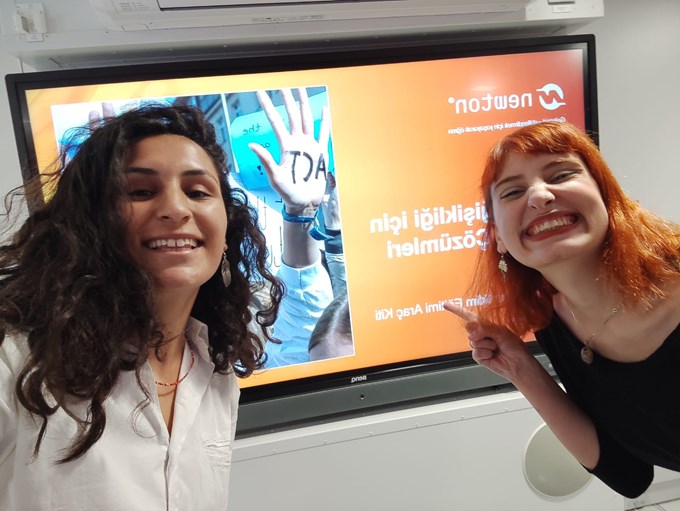 Educators Meryem Çelik and Selin Bilginer from the Science Heroes Association preparing to deliver the Design Solutions for Climate Change workshop in the Mobile Newton Room in Istanbul.
Educators Meryem Çelik and Selin Bilginer from the Science Heroes Association preparing to deliver the Design Solutions for Climate Change workshop in the Mobile Newton Room in Istanbul.
To bring the workshop to life, the Newton team collaborated with CSR Europe to pilot it in Italy, Greece, and Türkiye. In total, this involved the participation of 6 teachers, 6 schools, 3 STEM Ambassadors, and dozens of students, with workshops held in local schools, STEM centers, industry headquarters, and even the Mobile Newton Room in Istanbul. In Bologna, Italy, participating students had the opportunity to visit the Unipol Group Headquarters where they were invited to bring their ideas to life with the expertise of mentors from different departments, including Corporate Social Responsibility and Information Technology.
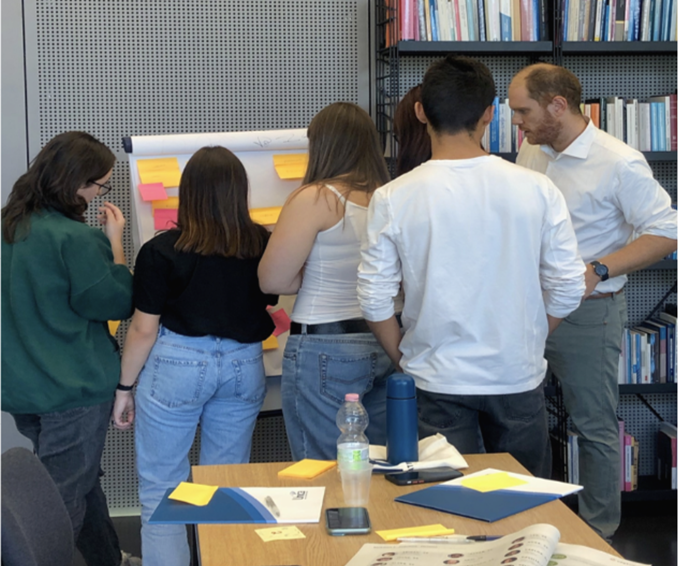 Students participating in the Design Solutions workshop are pictured here ideating with the Head of Managerial Training People Academy, Davide Angelini from the Unipol Group.
Students participating in the Design Solutions workshop are pictured here ideating with the Head of Managerial Training People Academy, Davide Angelini from the Unipol Group.
The culmination of these local workshops was the Together 4 STEM Virtual Innovation Camp on October 12, 2023. Here, four of the participating student groups had the opportunity to pitch their innovative app ideas to a jury comprising representatives from Toyota, Huawei, EU STEM Coalition, European Schoolnet, CSR Europe, Cummins Inc, and the European Commission.
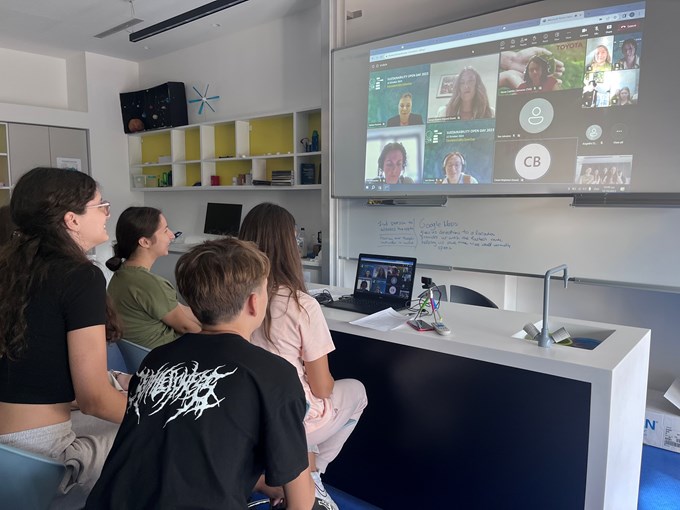 Students from Anatolia High School in Thessaloniki, Greece waiting to present their prototype, All in Green, to the jury of industry professionals as part of the online event on October 12, 2023.
Students from Anatolia High School in Thessaloniki, Greece waiting to present their prototype, All in Green, to the jury of industry professionals as part of the online event on October 12, 2023.
All of the pitches delivered on October 12 were impressive, demonstrating the effort the presenting teams put into turning their great ideas into innovative prototypes. Each prototype contained a start screen and 5 subsequent streets to showcase the app’s basic functionality. The four teams selected to present their prototypes to the jury showcased a remarkable blend of innovation and commitment to sustainability. The jury evaluated each of the pitches based on innovation, creativity, design, and its process, presentation skills, teamwork, and the potential for promoting sustainability at scale.
After a tough deliberation, the team from Türkiye, presenting Nature’s Dress, secured the top spot and will receive a live virtual session with STEM experts in the new year. “We are very happy with the success of our students,” says Meryem Çelik, a Newton Teacher working at the Mobile Newton Room run by the Science Heroes Association in Istanbul. “They worked hard to find an innovative solution for raising consumer’s awareness about climate change issues by encouraging them to reduce, reuse, and recycle with their prototype called Nature’s Dress. It was exciting to see them turn their ideas into reality and meet STEM Ambassadors along the way. It was a unique project for us as educators, but also for our students, and we are all so proud to be a part of it.”
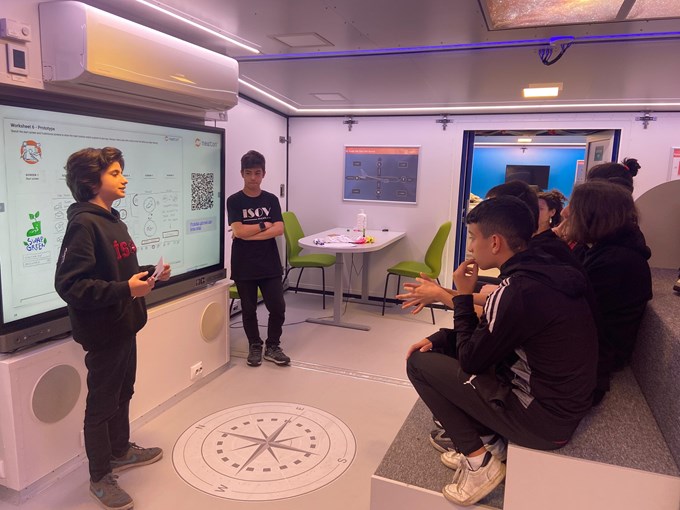 In Istanbul, local students pitched their initial ideas to their peers inside the Mobile Newton Room.
In Istanbul, local students pitched their initial ideas to their peers inside the Mobile Newton Room.
Similar sentiments were expressed by other educators involved. Iro Koliako, the STEM Coordinator at Anatolia High School, who led a hybrid version of the Design Solutions for Climate Change workshop at her school, described its outcome: “In the pursuit of addressing climate change, our students didn't just design apps; they cultivated a culture of innovation, sustainability, and collaboration. They proved that youthful ideas, when nurtured with knowledge and passion, hold the key to transformative solutions.” According to Koliako, “the Design Solutions for Climate Change workshop developed by Newton, sparked a transformative energy within every student that participated. The collective exchange of ideas was remarkable. Guided by activities that encouraged multifaceted thinking, this experience cultivated critical thought and honed their problem-solving abilities.”
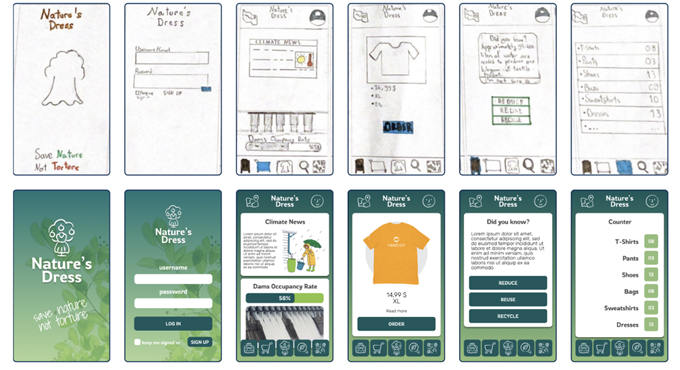
As illustrated above, participating students designed their prototypes on paper (top) and later received developed versions designed by Newton’s Creative Director, Niko Crnčević (below).
To recognize the impressive work of all participants, each team received prize packages, including certificates of achievement and letters signed by industry leaders. Notably, they also received a professionally designed version of their prototype, a tangible acknowledgment of their creativity and commitment, and an invitation to continue building out their incredible ideas. Newton’s Creative Director, Niko Crnčević, transformed the learner’s ideas into professionally designed prototypes. “It was inspiring to see that the learners were able to bring together their innovations with environmental consciousness to create solutions that could easily evolve into real and impactful products,” he says. “Seeing their ideas come to life affirms the importance of fostering a design thinking mindset in education when addressing real-world challenges.” The professionally designed prototypes were delivered to the participants after the workshop, allowing them to further showcase their inventive ideas to others:
● Nature’s Dress (Türkiye): An app encouraging sustainable clothing choices by preventing users from buying the same items repeatedly, rewarding recycling with tree-planting points.
● All in Green (Greece): An ambitious project focusing on helping people make sustainable choices in their daily routines, with features such as suggesting sustainable to-do lists and a built-in discussion forum.
● DANDY (Italy): A prototype for an app aiding users in locating stores offering sustainable or upcycled clothing, promoting more sustainable shopping choices through reward points.
● H2O Saver (Italy): A well-researched app helping users calculate water usage and suggesting ways to save water, including premium services for cleverly financing future app development.
The professionally designed prototypes were well-received by both the participating educators and students. “The dedication from the Newton team to enhance the prototypes of the applications developed by our students is truly commendable. We are excited to see the further developed prototype of All in Green. The inclusion of QR codes is a fantastic way for our students to showcase their work and delve deeper into the design process. This additional opportunity for collaboration and refinement will undoubtedly enrich their learning experience,” says Peggy Perakaki, the Coordinator of Social Responsibility Programs at Anatolia High School, who was also involved with the delivery of the workshop.
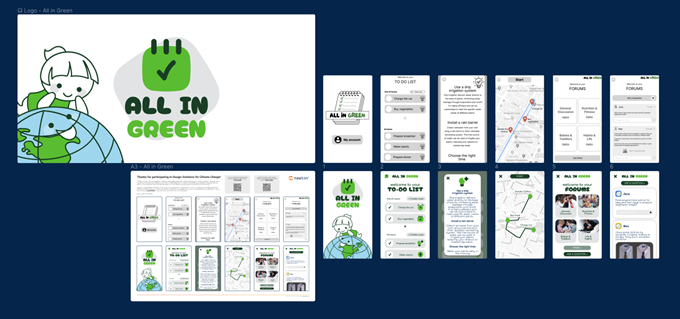
Work files were also returned to the learners to inspire continued development of their prototypes using Figma, a collaborative design tool. Pictured here is the original and developed mock-up of All in Green.
“Our partnership with Newton has been essential in advancing our shared dedication to STEM education. Collaborating closely, we aimed to provide inquiry-based and hands-on learning experiences to young minds across Europe, as with the Together 4 STEM Virtual Innovation Camp this year,” shares Lisa Simons, the Project Manager for the Together 4 STEM initiative at CSR Europe. “We recognize that with the expertise of Newton, we had a true shared impact on students while addressing the importance of STEM skills in facing current environmental challenges.”

The workshop consists of a facilitator’s guide, a presentation, and a set of worksheets focused on helping the learners engage with Design Thinking strategies. It is open-access and available in CSR Europe’s Climate Education Toolkit and directly via Notion here.